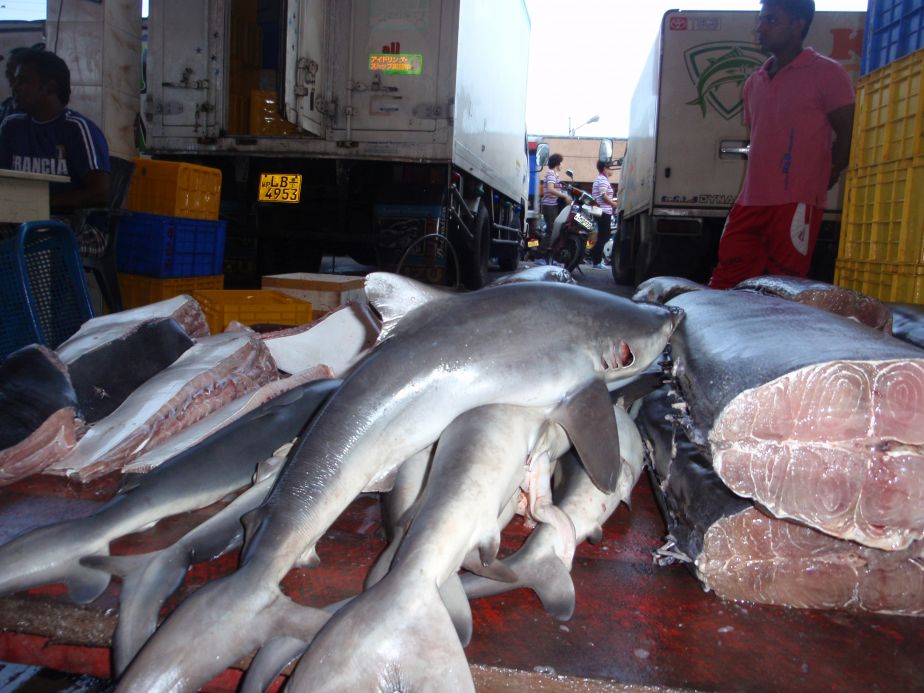Media Releases
Can Sharks Be Fished Sustainably?

Conventional wisdom holds that sharks can’t be harvested in a sustainable manner because they are long-lived animals. It takes time for them to reproduce and grow in numbers.
But a James Cook University researcher argues that sustainable shark fishing can be done with careful, science-based management.
Professor Colin Simpfendorfer from JCU said there are two main reasons why bans on shark fishing don’t work, and shark fisheries should be managed sustainably.
“First, most sharks are caught incidentally in fisheries for other species, and many die during capture and handling. Second, many communities depend heavily on sharks and rays as a source of animal protein so banning fishing may eliminate their only affordable source.”
In the new study in Current Biology, Professor Simpfendorfer and colleague Nicholas Dulvy from Canada’s Simon Fraser University assessed data available for 65 world-wide populations of sharks or shark relatives including rays and chimaeras. They found that 39 of these populations representing 33 species met the criteria for biological sustainability.
The researchers said there is no doubt that sharks (including rays and chimaeras) are in trouble, facing possibly the largest crisis of their 420-million year history.
“Tens of millions of sharks are caught and traded internationally each year, and many populations are overfished to the point where global catch peaked in 2003, and a quarter of species have an elevated risk of extinction,” said Professor Simpfendorfer.
The sustainably fished sharks accounted for about 9 percent of the current global catch and more than 200,000 metric tonnes in live weight. The scientists say this means sustainable shark fishing is not only possible, it’s already happening in some places. The researchers offer five recommendations to help in achieving sustainable shark fisheries, which exist today in nations including the United States, Australia, Canada, and New Zealand.
- Species with the lowest biological productivity must be protected.
- Precautionary science-based catch limits should be implemented by international management organisations for high-seas sharks.
- International treaties can help to support sustainable international fisheries and trade.
- Developed countries should offer assistance to developing countries to support the transition to sustainable shark fishing.
- Fisheries should implement mechanisms that trace shark products to their source, allowing consumers to choose products fished sustainably.
The researchers said that the notion of sustainable shark fins is unthinkable to many, but sustainable (though not necessarily managed) shark fisheries yield approximately 4,406 tons of dried fins. Despite this, consumers have no way of knowing whether products they buy are fished sustainably or not.
Professor Simpfendorfer said there are many ways to help reduce incidental catches of sharks and rays and new innovative techniques should continue to be developed. He said that, for instance, the banning of wire leaders on longlines can reduce the catch of sharks. The use of turtle excluder devices (TEDs) in shrimp trawls also helps to avoid capture of larger sharks and rays.
The scientists said there won’t be any simple answers to establishing sustainable shark fisheries as there are 1,200 shark species, and each challenge will be different in each country.
“This means that we need to redouble species-level data collection and increase status assessment of the most heavily fished populations so that we know how and when sustainability is achieved,” Professor Simpfendorfer said.
“We can fish for sharks and avoid extinctions without banning fishing, but we urgently need improved assessment and management.”
He said the next step for the team is to identify the lessons learned in sustainable shark fisheries and begin translating those into management recommendations that can be implemented in countries around the world.
Images: http://bit.ly/2lcTu7Z
Professor Colin Simpfendorfer
colin.simpfendorfer@jcu.edu.au
Professor Nick Dulvy
dulvy@sfu.ca
